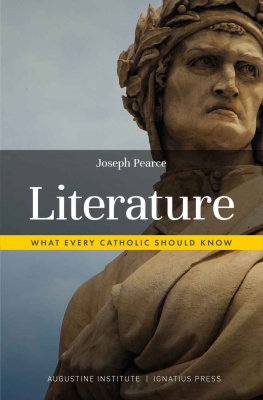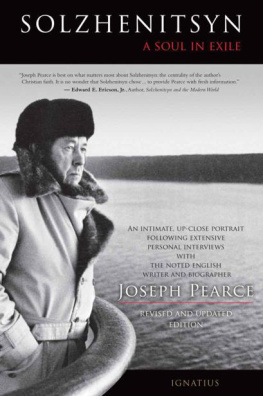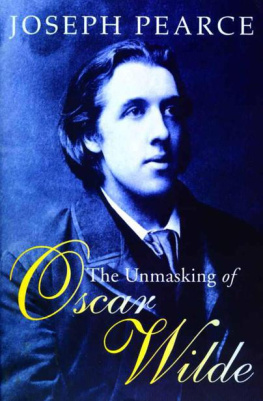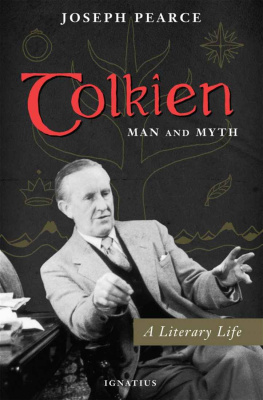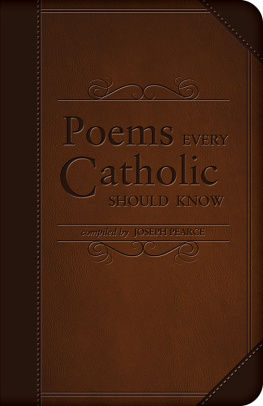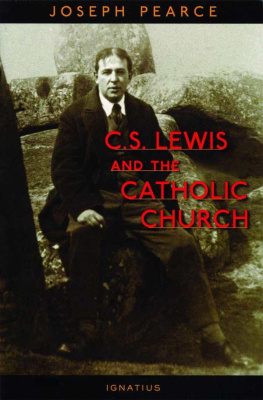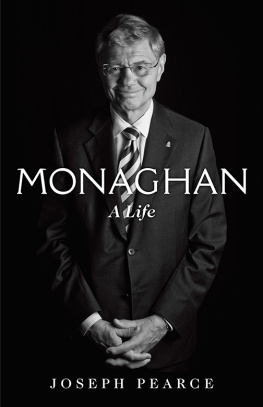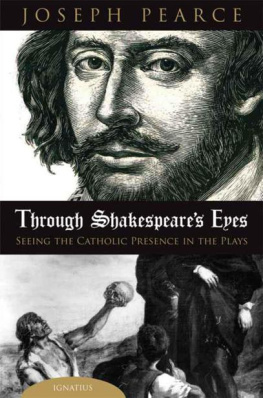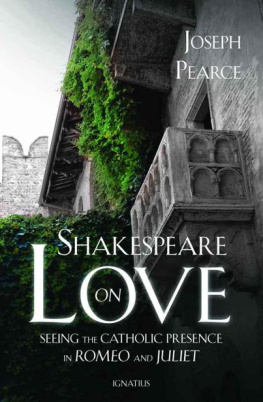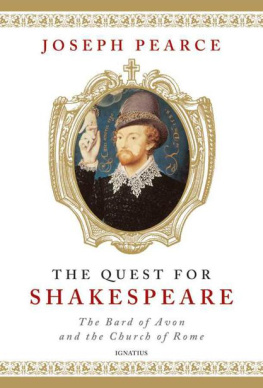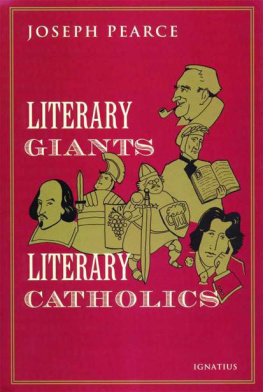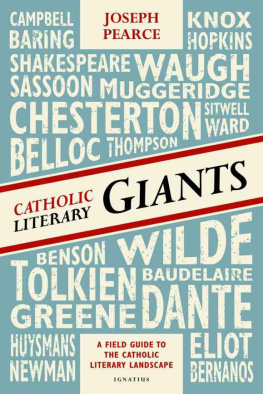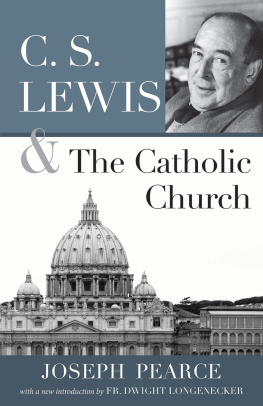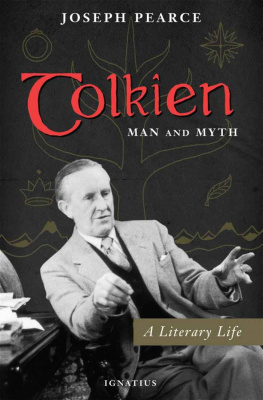Joseph Pearce - Literature: What Every Catholic Should Know
Here you can read online Joseph Pearce - Literature: What Every Catholic Should Know full text of the book (entire story) in english for free. Download pdf and epub, get meaning, cover and reviews about this ebook. year: 2019, publisher: Ignatius Press, genre: Religion. Description of the work, (preface) as well as reviews are available. Best literature library LitArk.com created for fans of good reading and offers a wide selection of genres:
Romance novel
Science fiction
Adventure
Detective
Science
History
Home and family
Prose
Art
Politics
Computer
Non-fiction
Religion
Business
Children
Humor
Choose a favorite category and find really read worthwhile books. Enjoy immersion in the world of imagination, feel the emotions of the characters or learn something new for yourself, make an fascinating discovery.
- Book:Literature: What Every Catholic Should Know
- Author:
- Publisher:Ignatius Press
- Genre:
- Year:2019
- Rating:5 / 5
- Favourites:Add to favourites
- Your mark:
- 100
- 1
- 2
- 3
- 4
- 5
Literature: What Every Catholic Should Know: summary, description and annotation
We offer to read an annotation, description, summary or preface (depends on what the author of the book "Literature: What Every Catholic Should Know" wrote himself). If you haven't found the necessary information about the book — write in the comments, we will try to find it.
In Literature: What Every Catholic Should Know, Joseph Pearce provides a survey of literary works of which all Catholics should be aware. Beginning with Homer and Virgil, the book progresses chronologically through the greatest works of all time, including Dante, Chaucer, Shakespeare, Jane Austen, Dickens, Chesterton, Eliot, Tolkien and Lewis.
Literature: What Every Catholic Should Know — read online for free the complete book (whole text) full work
Below is the text of the book, divided by pages. System saving the place of the last page read, allows you to conveniently read the book "Literature: What Every Catholic Should Know" online for free, without having to search again every time where you left off. Put a bookmark, and you can go to the page where you finished reading at any time.
Font size:
Interval:
Bookmark:
WHAT EVERY CATHOLIC SHOULD KNOW
WHAT EVERY CATHOLIC SHOULD KNOW
Joseph Pearce
IGNATIUS PRESS AUGUSTINE INSTITUTE
San Francisco Greenwood Village, CO
Ignatius Press Augustine Institute
San Francisco, CA Greenwood Village, CO
Cover Design: Ben Dybas
2019 Ignatius Press, San Francisco,
and the Augustine Institute, Greenwood Village, CO
All rights reserved
ISBN 978-1-7335221-2-0 (PB)
ISBN 978-1-64229-081-3 (EB)
Library of Congress Control Number 2019934543
Printed in Canada
For Dena Hunt, in admiration
Why Should Every Catholic
Know About Literature?
There is a very good reason for every Catholic to know the great works of literatureand that is because the great works of literature help us to know ourselves. This is the reason that we should learn the humanitiesbecause the humanities teach us about humanity, both our own humanity and the humanity of our neighbours.
In the great works of literature we discover a deep understanding of mans being and purpose. We discover that the human person is homo viator , a pilgrim or wayfarer who journeys through mortal life with eternal life always in mind. This understanding of who we are has been lost. The modern man, wrote Chesterton, is more like a traveller who has forgotten the name of his destination, and has to go back whence he came, even to find out where he is going. In fact, things are even worse than Chesterton imagined because modern man has not only forgotten the name of his destination, he has even forgotten that he has a destination. He does not know that he is a traveller. He is unaware that he is on a journey or that he has anywhere to go. He is not homo viator , but homo superbus , proud-man, a pathetic creature trapped within the confines of his own self-constructed self, a prisoner of his own pride and prejudice.
The great works of literature show us the folly of homo superbus as well as the wisdom of homo viator by contrasting the viciousness of the prideful villain with the virtuous humility and humanity of the noble hero. They show us that the good man is inspired in all that he does by the desire to serve his God and his neighbour, while the bad man is inspired by his desire to please himself. They show us that man is always oscillating between the two poles of his very nature. He is either falling into the folly of the idolatrous love of himself above all others, or he is edified by his selfless love for the other. Since this oscillation between sin and virtue is to be found in the heart of every man, it is also to be found at the heart of every age in history and in all the great works written throughout every age in history.
Viewing the panoramic vista of the history of the West, we can see three broad ages of man. The first of these ages is the pre-Christian or pagan age; the second age is the age of Christendom; and the third age may be called the age of Disenchantment.
In the pre-Christian or pagan age, the artists and philosophers examined the struggle between homo viator and homo superbus , perceiving the superiority of the former over the latter, albeit through a glass darkly.
In the age of Christendom we see, subsumed within the very fibre of the individuals conscience and in the very fabric of human society, the affirmation of homo viator and the condemnation of homo superbus . Christendoms chief characteristic is its overarching unity in the realms of philosophy and theology, a unity in which homo viator is not only admired but enshrined. In Christendom, sanctity and heroism are synonymous, with the absence of the one invariably leading to the destruction of the other. And since, for the orthodox Christian, sanctity is also synonymous with sanity, it was incumbent upon all men to overcome the temptations of homo superbus (the barbarian within ourselves) and to become perfect examples of homo viator (the saint as the epitome of the civilised man). In this sense the age of Christendom corresponds to the finest flowering of civilisation. It is an age in which becoming civilised is the very goal of mans existence because being civilised (holy) is the only means of attaining the perfect civilisation of Heaven. It is, therefore, hardly surprising that the heart of Christendomits theology, its philosophy, its painting, its architecture, its sculpture, its music, its literatureis the very incarnation of the integrated harmony, the wholeness and oneness, of its Founder.
In the age of Disenchantment, the wholeness and oneness of Christendom is lost in a progressive fragmentation of thought that continues to this day. From its earliest manifestation in the decay of the Christian humanism and neo-classicism of the Renaissance and its coming of age in the pride of the superciliously self-named Enlightenment, to its self-defeating victory in the nihilistic nonsense of deconstructionism, the age of Disenchantment represents the triumph of homo superbus over homo viator and, therefore, the triumph of barbarism over civilisation.
At this juncture, we should remind ourselves that these three ages do not represent a linear progression in the right direction, as the denizens of the age of Disenchantment would have us believe, but a manifestation of the perennial struggle between homo superbus and homo viator , between barbarism and civilisation. On the assumption that civilisation is preferable or superior to barbarism, it could be said more truthfully that the age of Disenchantment represents a move in a wrong or regressive direction. In any event, it is certainly wrong to presume that Disenchantment has replaced Christendom, in the sense that it has somehow eclipsed or extinguished the age that preceded it. On the contrary, Christendom is alive and well and existing simultaneously with Disenchantment. This should not surprise us because homo superbus can never utterly or ultimately defeat homo viator .
Although the culture has become fragmented and disintegrated in the age of Disenchantment, the presence of Christendom within the age of Disenchantment can be seen in the magic or miracle of Re-enchantment. Many of the greatest works of art in recent centuries are not the products of disenchantment but of re-enchantment. The works of Shakespeare, Dryden, Coleridge, Wordsworth, Dickens, Dostoyevsky, Chesterton, Lewis, Tolkien, Waugh, and Eliot, to name but an illustrious few, are inspired by a rejection of disenchantment and a desire for re-enchantment. And what is true of literature is true of painting (the Pre-Raphaelites), architecture (the Gothic Revival), and music (Bruckner, Mahler, Mendelssohn, Messiaen, Arvo Part, and others). This disillusionment with disenchantment represents a refusal to believe that reality is only the cold mechanism of the materialist or the meaningless mess of the nihilist; it is an awakening to the enchantment of reality, perceiving it as a miraculous harmony of being, a song, a Great Music, the Music of the Spheres. Hence the employment of disenchantment as the operative description of the process that calls itself the Enlightenment. The word enchantment derives from the Latin cantare , to sing, or cantus , song, and the disenchantment of the Enlightenment was the shift from seeing nature as creation, that is, as a beautiful work of art sung into existence by God, to nature as something merely mechanical and, later, as something merely meaningless. Thus, in the age of Disenchantment in which we currently find ourselves, the struggle between homo superbus and homo viator manifests itself in disenchantment and re-enchantment.
The great works of literature are works of enchantment which have the power to re-enchant the most weary of souls. They are the inheritance of all of us, or all of us who want them. In reading these great works we find ourselves in the presence of great minds thinking about great things. We find ourselves in the presence of almost three thousand years of genius. We find ourselves in the company of the illustrissimi of civilisation. In what better company could we possibly hope to spend our time? This side of the grave, there is no better company apart from the saints themselves. The better company, the best possible company, awaits homo viator after his temporal journey is over. In the meantime, and especially in the mean times in which we live, these great works of literature are good companions for the journey and excellent guides. Like the lembas which sustained Frodo and Sam on their journey through Mordor to Mount Doom in The Lord of the Rings , great literature is manna for the mind and food for the soul.
Font size:
Interval:
Bookmark:
Similar books «Literature: What Every Catholic Should Know»
Look at similar books to Literature: What Every Catholic Should Know. We have selected literature similar in name and meaning in the hope of providing readers with more options to find new, interesting, not yet read works.
Discussion, reviews of the book Literature: What Every Catholic Should Know and just readers' own opinions. Leave your comments, write what you think about the work, its meaning or the main characters. Specify what exactly you liked and what you didn't like, and why you think so.

